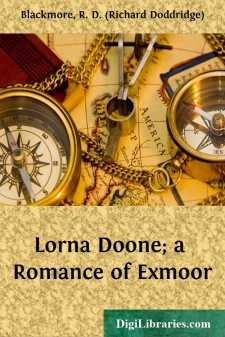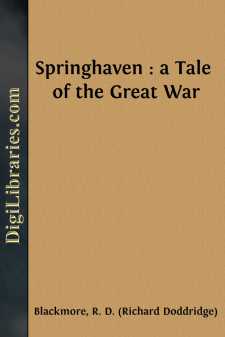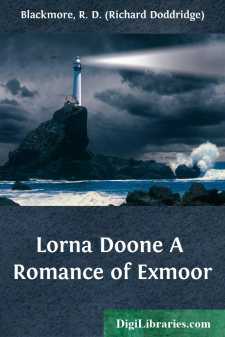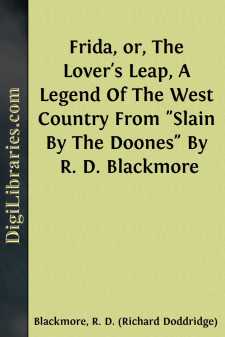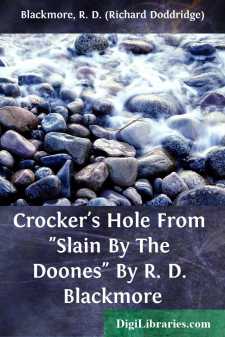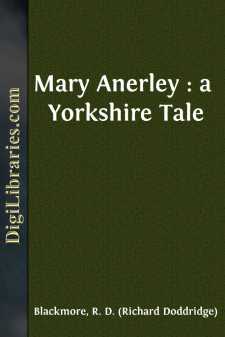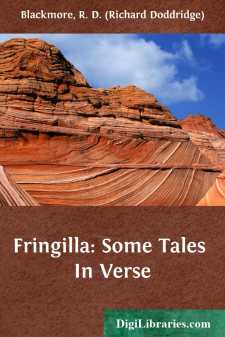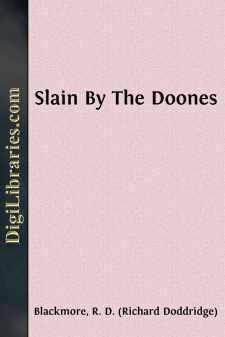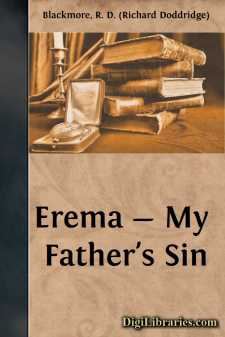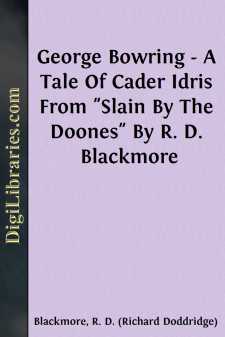Categories
- Antiques & Collectibles 13
- Architecture 36
- Art 48
- Bibles 22
- Biography & Autobiography 813
- Body, Mind & Spirit 142
- Business & Economics 28
- Children's Books 16
- Children's Fiction 13
- Computers 4
- Cooking 94
- Crafts & Hobbies 4
- Drama 346
- Education 46
- Family & Relationships 57
- Fiction 11829
- Games 19
- Gardening 17
- Health & Fitness 34
- History 1377
- House & Home 1
- Humor 147
- Juvenile Fiction 1873
- Juvenile Nonfiction 202
- Language Arts & Disciplines 88
- Law 16
- Literary Collections 686
- Literary Criticism 179
- Mathematics 13
- Medical 41
- Music 40
- Nature 179
- Non-Classifiable 1768
- Performing Arts 7
- Periodicals 1453
- Philosophy 64
- Photography 2
- Poetry 896
- Political Science 203
- Psychology 42
- Reference 154
- Religion 513
- Science 126
- Self-Help 84
- Social Science 81
- Sports & Recreation 34
- Study Aids 3
- Technology & Engineering 59
- Transportation 23
- Travel 463
- True Crime 29
Lorna Doone; a Romance of Exmoor
Description:
Excerpt
CHAPTER I
ELEMENTS OF EDUCATION
If anybody cares to read a simple tale told simply, I, John Ridd, of the parish of Oare, in the county of Somerset, yeoman and churchwarden, have seen and had a share in some doings of this neighborhood, which I will try to set down in order, God sparing my life and memory. And they who light upon this book should bear in mind not only that I write for the clearing of our parish from ill fame and calumny, but also a thing which will, I trow, appear too often in it, to wit—that I am nothing more than a plain unlettered man, not read in foreign languages, as a gentleman might be, nor gifted with long words (even in mine own tongue), save what I may have won from the Bible or Master William Shakespeare, whom, in the face of common opinion, I do value highly. In short, I am an ignoramus, but pretty well for a yeoman.
My father being of good substance, at least as we reckon in Exmoor, and seized in his own right, from many generations, of one, and that the best and largest, of the three farms into which our parish is divided (or rather the cultured part thereof), he John Ridd, the elder, churchwarden, and overseer, being a great admirer of learning, and well able to write his name, sent me his only son to be schooled at Tiverton, in the county of Devon. For the chief boast of that ancient town (next to its woollen staple) is a worthy grammar-school, the largest in the west of England, founded and handsomely endowed in the year 1604 by Master Peter Blundell, of that same place, clothier.
Here, by the time I was twelve years old, I had risen into the upper school, and could make bold with Eutropius and Caesar—by aid of an English version—and as much as six lines of Ovid. Some even said that I might, before manhood, rise almost to the third form, being of a perservering nature; albeit, by full consent of all (except my mother), thick-headed. But that would have been, as I now perceive, an ambition beyond a farmer's son; for there is but one form above it, and that made of masterful scholars, entitled rightly 'monitors'. So it came to pass, by the grace of God, that I was called away from learning, whilst sitting at the desk of the junior first in the upper school, and beginning the Greek verb [Greek word].
My eldest grandson makes bold to say that I never could have learned [Greek word], ten pages further on, being all he himself could manage, with plenty of stripes to help him. I know that he hath more head than I—though never will he have such body; and am thankful to have stopped betimes, with a meek and wholesome head-piece.
But if you doubt of my having been there, because now I know so little, go and see my name, 'John Ridd,' graven on that very form. Forsooth, from the time I was strong enough to open a knife and to spell my name, I began to grave it in the oak, first of the block whereon I sate, and then of the desk in front of it, according as I was promoted from one to other of them: and there my grandson reads it now, at this present time of writing, and hath fought a boy for scoffing at it—'John Ridd his name'—and done again in 'winkeys,' a mischievous but cheerful device, in which we took great pleasure....


